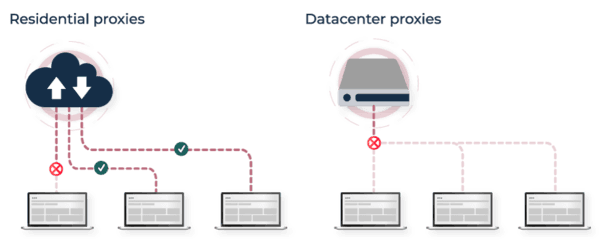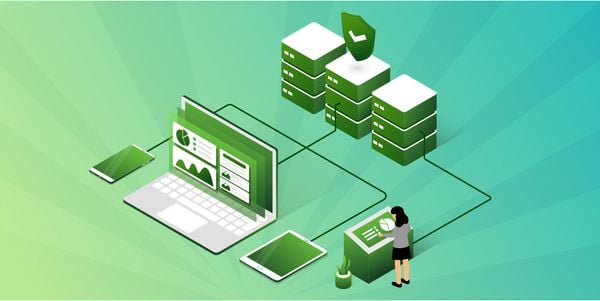
How 2FA Can Protect My Data
August 29, 2019
What is UPnP or Universal Plug and Play?
September 4, 2019A proxy server is like a gateway between your system and the internet. It separates end users from the websites that they browse. Proxy servers can provide multiple functions, provide security and privacy depending on your needs, use case, etc. Proxy servers are used to mask your IP address so that you can be anonymous location-wise, view geographically restricted sites, surf the world wide web without any risk, and gaming, etc.
Digital marketers need to be vigilant owing to the competition, and proxies are the best way to know what the world is up to in terms of marketing practices and trends. Proxies allow you to market your products worldwide know your customers better, understand their buying trends, etc.; which gives you a competitive edge in marketing. https://www.youtube.com/embed/jGQTS1CxZTEProxies are used by many businesses to gather data in bulk over a short period. It is estimated that on an average, 58.1% of web traffic is non-human and 22.9% of this traffic is bots that are employed by a business to gather information and gain competitive intelligence.
Proxy servers are also beneficial in protecting you from security breaches. They act as firewalls and web filters. A proxy server keeps users protected from malware present on the internet. Thus, proxy servers provide a high level of privacy.
What Are Data Center Proxies?
Datacenter proxies are a common type of proxies in use these days. It is a proxy linked to the datacenter to help mask your IP address and hence your identity. Data center proxies have nothing to do with your internet connection or your ISP; they are independent of both.
These proxies have a lot of benefits, including hiding your identity, scrape data, cop sneakers, etc. without revealing your identity. With data center proxies, it easy to change your geographical location, which means if in your country a TV show is banned, you can access the same with a proxy located in Australia or UAE and watch your favorite shows.
These are commercial proxies or IP addresses that are not owned by ISPs and are not assigned to any individual.
Types of Proxies:
- Data center proxies
- Residential proxies
Data center proxies are IP addresses that are offered by another corporation, and not by an ISP. When you visit a website, the web server will detect the credentials of the data-center proxy instead of your actual information. It’s a great way to remain anonymous on the internet since nothing about your network requests can be traced back to you.
Data center proxies are cheap, fast, and stable. But, they might be blocked easily if you are using it for web scraping.
Types of Data Center Proxies:
- Secure socket Proxy (SOCKS)
- Hypertext transfer protocol (HTTP) proxies
Data center proxies can be of two kinds, mainly Secure socket Proxy(SOCKS) & hypertext transfer protocol(HTTP) proxies.
To understand the HTTP proxies, let us know the HTTP protocol first. While browsing the web, you see HTTP in the web browser, which means that the site uses HTTP protocol. The HTTP protocol functions on the client-server model that focuses on request and responses. The client here is the web browser. The browser sends information, called an HTTP request in the form of URL.
The server here is either an application or any system that receives the information. The server responds to the information with a package of resources that are in HTTP format. And this information goes back to the client.

To simplify, the HTTP protocol allows you to browse the web. This protocol is used by websites so that they can access or view the websites. To browse the website anonymously, apart from the server and the client, you can add a proxy to the combination. You have a choice of proxy to add. HTTP or SOCKS.
HTTP proxies are built for being used in the HTTP protocol. These HTTP protocols have certain specific functions, hence specific proxies and their popularity on the web. As they are built only for the HTTP protocol, it becomes easy to browse the internet with them.
In function, HTTP proxies can read the data that is transferred between the client and server, which means that the data can be recorded. As an exception, some HTTP proxies support the connect method. The proxies establish a tunnel connection which is secure, safe, and cannot be traced. These proxies are HTTPS proxies.
SOCKS Proxies Advantages and Disadvantages
SOCKS proxies are a general type of proxies. These proxies are not built with any protocol in mind. They are more diverse and are actually lower level proxies.
Advantage: SOCKS proxies are not restricted to a specific port of network protocol. SOCKS are thus more flexible in nature. These are faster because there is not much code, and they are simpler, to download and transfer data faster.
Disadvantage: SOCKS proxies itself do nothing to safeguard your data. It is just a proxy between your other internet connections. Any data going between consumer and SOCKS is not secure.
Unlike the HTTP proxies, SOCKS proxies cannot understand the data that they transfer. The connection is always secure as SOCKS proxy will not know what is being passed from client to server and vice versa. SOCKS proxies also use the tunneling method like HTTPS proxies. SOCKS proxies are a little faster than dedicated proxies. They are of great use if you are transferring or downloading a lot of data. SOCKS5 is a recent version of SOCKS which is more secure than SOCKS or SOCKS4.
Residential Proxies Advantages and Disadvantages
Residential proxies are different from data center proxies in a way that they are connected to real residential addresses that are impossible to ban. This allows you to effectively hide your actual IP address, work around geo-blocked content or scrape, and harvest data from around the web. Providers of residential IP proxies take these personal IP addresses and sell them.
Advantage: Residential proxies are not easily blocked, wholly legitimate, and allow you to send more query per minute.
Disadvantage: Residential proxies lack anonymity, have difficulty in the acquisition, and are costly to buy.
Features of Most Data Center Proxies
- 1000MB/s speed: these proxies work great for high performance with 1000MB/s speed/
- Instant IP refresh: You can change your proxy IP anytime on demand.
- Several Global locations: Must have a presence in multiple countries worldwide.
General Features of Proxies
- High performance: Provides high performance with multi-threaded software.
- Anytime refresh: Proxy IP can be changed on demand, as required.
- Simultaneous usage: Multiple IPs can be added to be authenticated for proxy usage.
- Multiple locations: Should be available in various areas like USA, UK, etc.,.
- Dedicated ISPs: IP address remains specific to you. You need not share it with anyone.
- Multiple subnets: Proxies from multi mixed subnets from nationwide locations. Ex: 300subnets
- Highly anonymous: Anonymity must be guaranteed. All headers must be dialed.
The Bottom Line:
Using data center proxies and connecting to a residential IP hides your real identity or IP from the internet. Using a data center proxy will not necessarily get your accounts suspended, but it is a red flag to many major platforms. Certain websites restrict data center proxies in general, in such cases residential IP connections are beneficial.
Determine which type of connection you need for your purpose of buying a provider or setting up your own network to obtain IPs. Data center proxies are excellent if you need to gather data quickly and cheaply. They are known to work best for market research and brand protection.
